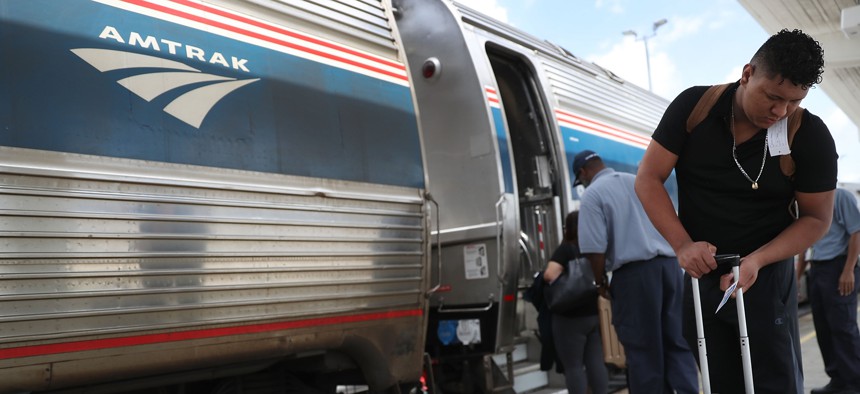Gulf Coast passenger rail to restart, but won't go to Florida
Amtrak and freight railroads said they struck a deal to revive the route. It’s a bright spot for passenger rail advocates who hope to see service expand as new federal infrastructure funding flows.

Passengers board an Amtrak train at the Miami station in this 2017 file photo. Photo by Joe Raedle/Getty Images
Amtrak and two freight railroads reached a last-minute agreement to restart passenger rail service along the Gulf Coast last week, ending for now a years-long standoff that could have affected the Biden administration’s plans to expand passenger service throughout the country.
For now, however, that service won't extend into the Sunshine State.
“The parties filed a motion today informing the Surface Transportation Board that a settlement agreement has been reached and asking that the case be held in abeyance while the parties execute the various conditions of that settlement agreement,” wrote Amtrak, CSX, Norfolk Southern and the Alabama State Port Authority in a joint statement.
They said they could not provide any details of the agreement at this time.
The deal comes as a surprise, as both freight rail carriers adamantly opposed Amtrak’s efforts to re-establish twice daily service between New Orleans and Mobile. Amtrak stopped providing the service after the rail line was damaged in Hurricane Katrina 17 years ago.
For years, local officials in Florida have clamored to restore Amtrak service from New Orleans all the way to Orlando, including a stop in the state capital of Tallahassee, but those efforts have been unsuccessful.
The freight railroads, which own the track that the new trains would use, wanted Amtrak to foot the bill for major track renovations along the 120-mile route. At one point, CSX estimated that the cost of those improvements would be $440 million.
But Amtrak had powerful allies on its side.
U.S. Sen. Roger Wicker of Mississippi, the top Republican on the Senate panel that oversees rail operations, has long been a vocal proponent of restarting the Gulf Coast service, which would make four stops in Mississippi. In fact, Transportation Secretary Pete Buttigieg accepted an invitation from Wicker to tour the rail line in person, when Wicker questioned Buttigieg in his Senate confirmation hearing
At a September hearing, Wicker urged Amtrak chair Tony Coscia to make a deal on the Gulf Coast route, even if it left larger questions for the rest of the country unresolved. Coscia seemed to agree with Wicker on that point.
But the Gulf Coast dispute took on outsized national importance after Congress passed an infrastructure law last year that would pay for a major expansion of passenger rail service for the first time in half a century. Most of that service would have to travel along freight rail routes, because Amtrak owns very little of its own track outside of the Northeast Corridor.
(In fact, Louisiana officials want to start passenger rail service between New Orleans and Baton Rouge using money from the infrastructure law, which would complement the Gulf Coast Amtrak service.)
The Surface Transportation Board, an independent federal agency that decides disputes between railroads and their customers, held several hearings on the Gulf Coast dispute. It ordered the parties into mediation in June, but the talks stretched past several deadlines. The STB planned to hold further hearings and decide the case in the coming weeks.
The Biden administration encouraged the STB to back Amtrak, especially given the likelihood that the decision would affect similar disputes between freight and passenger railroads as passenger rail service is expanded.
While the STB members avoided making public comments about the Gulf Coast case, the board made clear its frustration with industry practices that contributed to massive supply chain disruptions earlier this year.
The board brought top freight rail executives before it during a two-day hearing in April to discuss delays throughout the rail networks. The board also invited customers such as farmers and chemical companies to share their frustrations about the service.
Buttigieg testified at that hearing, too, the first time in 20 years a U.S. transportation secretary appeared before the board. STB later ordered the country’s four largest freight railroads to report on how they planned to improve service and then castigated the carriers for submitting “perfunctory” plans that lacked detail.
Last month, STB created an office of passenger rail to investigate and analyze issues on Amtrak’s on-time performance.
Congress created Amtrak in 1970 to help financially beleaguered railroads shore up their operations. As part of the deal, the freight railroads had to allow – and even give preference to – passenger rail operations on their rights of way. But Amtrak maintains that a disproportionate amount of delays on its trains are caused by freight railroad decisions.
The freight railroads have also faced public scrutiny for their labor relations, and, despite a White House brokered settlement, the possibility of a strike by rail workers has grown over the last week.
On Tuesday, STB Chair Martin Oberman said the Gulf Coast deal would “result in a substantial public benefit.” He alluded to the fact that both Norfolk Southern and CSX had installed new CEOs this year, “which I expect brought a fresh constructive approach to resolving the matter.”
“The board has stated many times our strong preference for private parties to operate in good faith and to amicably resolve disputes on their own whenever possible to obviate the need for board action,” he added.
Passenger rail advocates praised the development.
“This settlement is a tremendous victory for the Gulf, but its impact extends beyond those states. The restoration of this service is pivotal for expanding passenger service across the nation, making good on the promise of the 2021 infrastructure law,” said Beth Osborne, the director of Transportation for America, in a statement.
“This settlement is a clear indication that we can find mutually-agreeable resolutions that benefit both freight and passenger rail—shippers and the people they serve,” she added. “Urban and rural communities across the country have been closely monitoring this process, and they can now look at this agreement with hope for the expansion of passenger rail.”
The Rail Passengers Association said it was encouraged by the development but wanted to know more of the details of the agreement.
“Rail Passengers hopes the terms of the settlement may provide a guidepost for the timely addition of passenger rail service to new corridors,” Jim Mathews, president and CEO of the group, said in a statement. “If we want the U.S. passenger rail network to catch up with our global competitors, we cannot require that states, cities and citizens invest 17 years to launch a new service.
Wicker, the Mississippi senator, called the decision a “long overdue win,” adding, “I look forward to riding Amtrak to stations in Bay St. Louis, Gulfport, Biloxi and Pascagoula again soon.”
Daniel C. Vock is a Washington, D.C.-based senior reporter for Route Fifty, where a version of this story first appeared.
NEXT STORY: Hurricane season marked by deadly Ian, destructive Nicole
